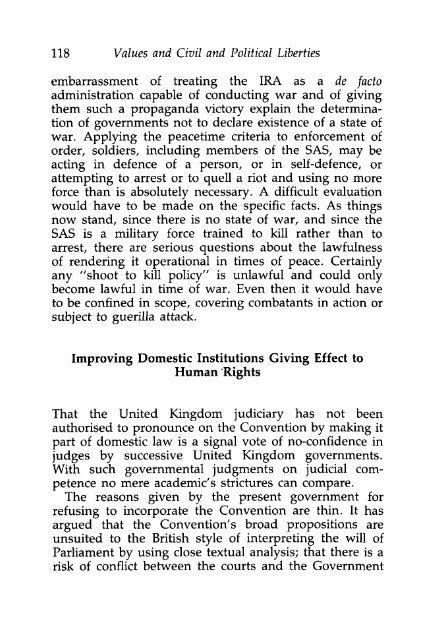The United Kingdom and Human Rights - College of Social ...
The United Kingdom and Human Rights - College of Social ...
The United Kingdom and Human Rights - College of Social ...
Create successful ePaper yourself
Turn your PDF publications into a flip-book with our unique Google optimized e-Paper software.
118 Values <strong>and</strong> Civil <strong>and</strong> Political Liberties<br />
embarrassment <strong>of</strong> treating the IRA as a de facto<br />
administration capable <strong>of</strong> conducting war <strong>and</strong> <strong>of</strong> giving<br />
them such a propag<strong>and</strong>a victory explain the determination<br />
<strong>of</strong> governments not to declare existence <strong>of</strong> a state <strong>of</strong><br />
war. Applying the peacetime criteria to enforcement <strong>of</strong><br />
order, soldiers, including members <strong>of</strong> the SAS, may be<br />
acting in defence <strong>of</strong> a person, or in self-defence, or<br />
attempting to arrest or to quell a riot <strong>and</strong> using no more<br />
force than is absolutely necessary. A difficult evaluation<br />
would have to be made on the specific facts. As things<br />
now st<strong>and</strong>, since there is no state <strong>of</strong> war, <strong>and</strong> since the<br />
SAS is a military force trained to kill rather than to<br />
arrest, there are serious questions about the lawfulness<br />
<strong>of</strong> rendering it operational in times <strong>of</strong> peace. Certainly<br />
any "shoot to kill policy" is unlawful <strong>and</strong> could only<br />
become lawful in time <strong>of</strong> war. Even then it would have<br />
to be confined in scope, covering combatants in action or<br />
subject to guerilla attack.<br />
Improving Domestic Institutions Giving Effect to<br />
<strong>Human</strong> <strong>Rights</strong><br />
That the <strong>United</strong> <strong>Kingdom</strong> judiciary has not been<br />
authorised to pronounce on the Convention by making it<br />
part <strong>of</strong> domestic law is a signal vote <strong>of</strong> no-confidence in<br />
judges by successive <strong>United</strong> <strong>Kingdom</strong> governments.<br />
With such governmental judgments on judicial competence<br />
no mere academic's strictures can compare.<br />
<strong>The</strong> reasons given by the present government for<br />
refusing to incorporate the Convention are thin. It has<br />
argued that the Convention's broad propositions are<br />
unsuited to the British style <strong>of</strong> interpreting the will <strong>of</strong><br />
Parliament by using close textual analysis; that there is a<br />
risk <strong>of</strong> conflict between the courts <strong>and</strong> the Government

















